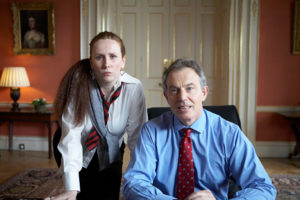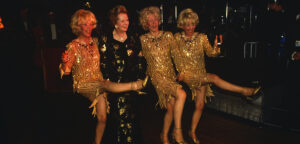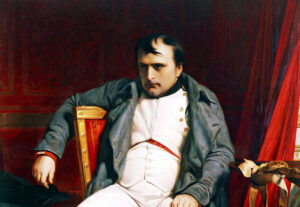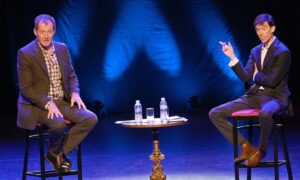A gentleman, runs the old joke, is someone who can play the bagpipes, but doesn’t. Alastair Campbell, podcaster, novelist and sometime press secretary to Tony Blair, plays the bagpipes. Indeed, one of his earliest published pieces — in the pornographic magazine Forum — boasted of the erotic appeal of the instrument to women. But then, as he later admitted, his work for the magazine was “mainly fiction”.
It would be unfair to suggest that the same was true of his journalism, but his stint as political editor of the Daily Mirror, starting in the late Eighties, was not distinguished. He was tribally loyal to Labour, and these were dark days for the party, which had lost three elections in a row and was shortly to lose a fourth, in 1992. His response was to fill the paper’s news pages with relentlessly partisan abuse. As a hack, his best-known contribution to political debate was starting a rumour that John Major tucked his shirt into his underpants. (“I am only 90% sure of the accuracy of the claim,” he acknowledged.)
Perhaps some of the bitter triviality reflected his own thwarted hopes. In the run-up to the 1992 election, he was widely touted as the front-runner to become Neil Kinnock’s press officer should Labour win. But when Labour didn’t win, Campbell had to wait instead for the election of Tony Blair as leader in 1994 before getting the summons to become his press secretary. The job title didn’t reflect the role, Blair hastened to add; “it’s much more than that,” he said.
So it was to be. Campbell was generally referred to as a spin doctor, a relatively new term that had crossed the Atlantic in 1988 and entered the Oxford English Dictionary the following year. The job of the spin doctor, according to Peter Mandelson, the first British figure to be so described, was “to create the truth”. There were limits, though. “They can cajole and protest and manipulate and bully if they want,” Campbell explained. “They can explain their master’s thinking. But the master’s thinking and actions are what count.”
That was the role occupied by Bernard Ingham when he was Margaret Thatcher’s press secretary, but many felt that the master-servant image was no longer entirely accurate. “When you heard Bernard Ingham speaking, you heard Margaret Thatcher,” observed ex-Labour aide Joy Johnson. “When you heard Tony Blair, very often you heard Alastair Campbell.” It was a common perception, and Blair did little that might correct it; in his memoirs, he wrote of Campbell: “He was indispensable, irreplaceable, almost an alter ego.”
In any event, Campbell was — with Blair, Gordon Brown, and Mandelson — one of the Four Horsemen of New Labour. Following the election triumph of 1997, he accumulated still greater power. He ran an ever-expanding empire of press officers and political advisers at the expense of the civil service, he attended cabinet meetings in a way that his predecessors had not, and he took on the role of party discipline at Westminster: in a symbolic move, the press team moved into 12 Downing Street, traditionally the preserve of the Whips’ Office. Charges of control freakery were widely aired.
He was, everyone agreed, supremely good at his job. A large part of that job, however, seemed to include dragging politics down to the level of his commentary at the Daily Mirror. “Alastair tabloidery,” Blair called it, the tendency to pursue headlines rather than deliverable policies. “Political coverage in this country is a joke,” Campbell complained in 1999. “Most of the national media treat politics as a soap opera.” He made his contribution to that.
He contributed too to the growing distrust of politicians. Blair had been elected as the alternative to Tory sleaze, but by 1999 The Sun, which had backed Labour in the general election, was calling the prime minister “Tony Bliar”. Much of the criticism was aimed at Campbell’s media operation. Back in 1996, he’d appeared in a libel case and been castigated by the judge for being “less than completely open and frank”; he was “not a witness in whom I could feel 100% confidence”. By the turn of the century, there were many who agreed with that judgement.
It came to a head, of course, in the 2003 invasion of Iraq. An intelligence dossier was released to justify the war, and when the BBC queried the degree of political interference in its preparation, Campbell decided that the best form of defence was attack. The ensuing battle cost the jobs of the BBC’s chairman and director general, and the life of the UN weapons inspector David Kelly, who killed himself after being identified as a source for the story. “If Alastair Campbell hadn’t started his war against the BBC, then Dr Kelly would still be alive today,” said Sky’s political editor, Adam Boulton, while the headline in Campbell’s old paper the Daily Mirror was: “Spun to death — Iraq expert driven to tragic ‘suicide’.”
Campbell resigned in 2003, but returned to run the 2005 election campaign, completing Blair’s remarkable hat trick of victories. After that, though, the magic seemed to have been lost. He helped with the unsuccessful elections of 2010 and 2015 and was an adviser to the equally unsuccessful People’s Vote campaign to get a second referendum on Brexit. Nonetheless, it was Brexit that gave him a new lease of media life: he became editor-at-large of The New European, and launched The Rest Is Politics podcast with fellow Europhile Rory Stewart.
Now comes a new book, But What Can I Do?, about the deplorable state of politics today. His analysis will come as no great revelation. He’s sympathetic to the idea of a written constitution; he thinks social media “has done much to harm thoughtful public debate”; he deplores “the culture war distractions of the radical Right”; he recycles lame gags about “Kamikwasi Trussonomics”.
As a state-of-the-nation address, it comes with inbuilt obsolescence, with all the temporary nature of journalism, full of references to what happened “last autumn” or “last November”. Despite which, it seems stuck in 2018, so that former US president Donald Trump gets five times as many mentions as current British Prime Minister Rishi Sunak. It feels like reading yesterday’s papers.
Much of it is a rambling, sometimes ranting, denunciation of “the Trumps, Johnsons, Netanyahus, Putins and Bolsonaros”, the populist leaders who have wrecked the democratic process. That’s a fairly disparate collection of individuals, but Campbell argues that there are common traits. Populists, he writes, are those who denounce “the elite”, and use the polarising language of “us” and “them”. And they’re not just to be found on the Right; there are also “populists of the Left”. There are those who divide the nation into “the forces of progress and the forces of conservatism”, while railing against “the cynics, the elites, the establishment”. Oh, hang on, that was Blair in a 1999 conference speech, which doesn’t get a look-in here.
These new populists are also barefaced liars. When did this casual attitude towards the truth start, one might ask? Certainly not on Campbell’s watch; he’s keen to point out that there were “several official and parliamentary inquiries” into Iraq, “none of which concluded that I lied”. In fact, not even his political enemies were deliberately deceitful in the old days. From Margaret Thatcher to Theresa May, he says of the prime ministers before Johnson, “none were in my view liars”. This wasn’t always his view. “Truth. Remember that,” he challenged in 1992. John Major and Norman Lamont “lie because it comes easy to them and because it is the only way they can survive”.
He sometimes sounds like one of those academics who is triggered by the sight of a Union Jack and takes to Twitter to announce that we’re now living in a fascist regime. Mention referendums, for example, and we’re straight onto Vladimir Putin staging a rigged vote in the occupied parts of Ukraine. In 1975, Thatcher quoted Clement Attlee’s description of referendums as “a device of dictators and demagogues”; Campbell notes this approvingly, but forgets to mention that it was New Labour that made referendums part of normal politics in the first place.
Similarly over-wrought is Campbell’s claim that the British Right-wing press “would not look out of place in North Korea”. To be fair, though, it does take him until p. 34 to go for the inevitable comparison, segueing effortlessly from Nigel Farage to “Europe in the Thirties”. But once it’s out in the open, we get an entire chapter on “The Threat of Fascism”. This would all be more convincing if we hadn’t been here before. “Britain is being run by a dictatorship,” was Campbell’s implausible verdict on Major’s government in 1992.
One could go on. He’s shocked — shocked! — at the sight of Johnson’s government “attacking the BBC”. That’ll be the same BBC that he denounced as a “down-market, dumbed down, over staffed, over bureaucratic, ridiculous organisation”, even before the War of the Dodgy Dossier.
But the point is not just that Campbell is wildly forgetful of his own time in politics and journalism. It’s more that, by airbrushing the past, he’s avoiding the issues. He leaves the big questions unasked, let alone answered. Why did Farage’s populist rhetoric about “the elite” resonate with so many? Might it be because of the extraordinary accumulation of wealth by the super-rich during New Labour’s time in office? Was disillusionment prompted by a government that the public thought was on their side proving instead to be “intensely relaxed about people getting filthy rich”?
If you’re looking at disengagement from the political process, it’s worth considering the 2001 general election, when turnout was so low that the number of abstentions was greater than the number who voted for Labour.
In Campbell’s analysis, however, the rot only set in with the global financial crisis of 2008, an event so massive that it warrants an abbreviation: the GFC. His coverage is so brief, however, that those initials only get used once. Maybe he doesn’t like to dwell, lest he has to explain why Britain was so exposed to the banking meltdown that started in America. After the event, Gordon Brown complained that a “shadow banking system had proliferated without politicians being aware of it,” and it’s hard not to think that the man who’d been chancellor for a decade perhaps should have been aware of it.
On a personal level, Campbell’s problem — the reason he worries about whether he’s “Dadsplaining” — is that he’s been overtaken by the world he helped to create. He would obviously disagree, but surely Boris Johnson and Dominic Cummings are part of his legacy. So too, perhaps, is Brexit itself. Partly because even Campbell’s famed tabloid instincts failed to alert him to the impact of the huge rise in immigration. But even more for squandering the chance of moving closer to the European Union.
Because the biggest issue in Blair’s first term — even if it was ducked — was the single currency, and the imminent arrival of the euro. Should Britain join this venture or not? Blair was in favour. Gordon Brown was not. Nor was Rupert Murdoch, whose views carried some weight. And Campbell? Well, he wasn’t much fussed one way or another. “I was not that bothered about the euro,” he wrote in his diary. “It didn’t move me like a Labour v. Tory battle did.”
Maybe he should have cared a little more. Regardless of whether one thinks it would have been good for the country, being part of the single currency would have been transformative. It would have tied Britain so closely to Europe that it would have made a Leave vote very unlikely, indeed would have made a referendum unlikely.
Without Brexit, though, where would Campbell be now? His belated rallying to the European cause has been the re-making of his reputation, wiping away much of the stain of Iraq. As he was during his time at the Daily Mirror, he’s now fighting rearguard actions for the losing side, and it’s a role that suits him admirably. The player of the pipes might not call the tune, but he does get his voice heard.
Disclaimer
Some of the posts we share are controversial and we do not necessarily agree with them in the whole extend. Sometimes we agree with the content or part of it but we do not agree with the narration or language. Nevertheless we find them somehow interesting, valuable and/or informative or we share them, because we strongly believe in freedom of speech, free press and journalism. We strongly encourage you to have a critical approach to all the content, do your own research and analysis to build your own opinion.
We would be glad to have your feedback.
Source: UnHerd Read the original article here: https://unherd.com/







